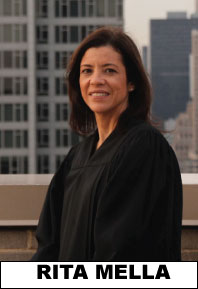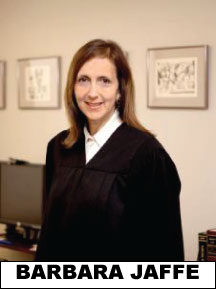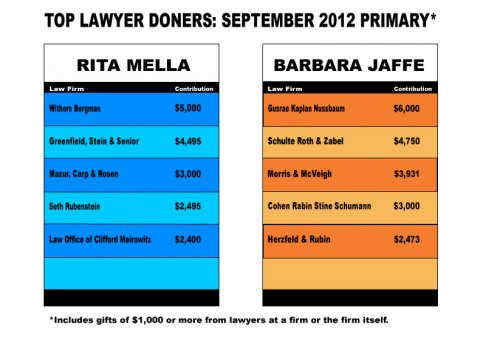Two Civil Court judges are vying to become the Democratic Party's candidate for Surrogate in Manhattan: Barbara Jaffe, who handles divorces in Manhattan as an acting Supreme Court justice, and Rita Mella, who sits in the Criminal Court in Manhattan.
In terms of finances, the two are evenly matched with their war chests within $3,500 of each other as of July 12. Judge Mella has deeper political support, and Justice Jaffe more former judges in her camp.
If elected, Judge Mella would become the first surrogate of Dominican ancestry in New York City.
On Thursday Sept. 13, Democratic voters will select their candidate to succeed Surrogate Kristin Booth Glen who will leave the bench at the end of the year, having reaching the mandatory retirement age of 70. The primary function of the Surrogate's court is to oversee the disposition the property of people after they die.
Both candidates had unusual paths to the law. Judge Mella, 50, came to this country from the Dominican Republic at 22 for graduate study in Latin American history and seven years later received her degree from CUNY Law School in 1991.
For Justice Jaffe, the law was a second career. After spending seven years helping manage a wholesale arts and antiques business, she enrolled in Brooklyn Law School and received her law degree in 1984.
Both candidates spent the bulk of their pre-bench careers as law clerks. Justice Jaffe, 60, worked as a law clerk for 16 years, nine of them for Marcy L. Kahn, now a Supreme Court justice and one of the first openly gay judges. Justice Jaffe was elected to the Civil Court in 2001 and appointed as an acting Supreme Court justice in 2010. In addition to handling matrimonial trials, Justice Jaffe manages a a docket of cases against New York City until they are ready for trial.
Judge Mella worked as a law clerk for thirteen years prior to her election to the Civil Court in 2006. For 10 of those years she worked for Justice Richard Rivera, including a four-year stretch while he was the judge in charge of the Civil Court in Brooklyn. After Justice Rivera passed away, she clerked for Judge Margarita Lopez Torres for three years in Criminal Court and then for another year after her boss was elected to the Surrogate's Court in 2005. Surrogate Lopez Torres was the first person of Hispanic heritage to win election as a surrogate.
Since being elected to Civil Court, Judge Mella has been assigned to the Criminal Court in Manhattan. During that time she presided over the Misdemeanor Treatment Court for three years.
Justice Jaffe has been found highly qualified to be a surrogate by the court system's screening panel. The panel's evaluation of Judge Mella is still in process, said David Suarez, Judge Mella's campaign manager.
Handling Appointments
Surrogates have extensive responsibility for appointing lawyers and others to perform different tasks in the cases they handle. Surrogates also set the compensation of their appointees, a highly sensitive task since the fees are withdrawn from the estates the surrogates are charged with protecting.
Over the years, and more recently in Brooklyn and the Bronx, those appointments have erupted in scandals that have tarred the judiciary. For many years, however, there has been no such problem in Manhattan. Surrogate Glen made fee awards totaling $217,128 in 40 instances during the last 12 months, according to a search of a database maintained by the court system.
Among the appointments surrogates make is the designation of the counsel to the Public Administrator, the official who processes the estates of persons who die without a will. According to an audit done by the New York City Comptroller's Office for the 2010-11 fiscal year, two counsels to the Public Administrator in Manhattan (each of the two surrogates elected in Manhattan appoints one) were paid at total of $822,000 for work on cases without wills. A source familiar with the operation of the Public Administrator's office said the figure in the Comptroller's audit seems low and that "a conservative" estimate of annual compensation for each counsel would be around $750,000.
Both candidates said in interviews they would follow the procedures put in place by the Office of Court Administration (OCA) and Surrogate Glen, and essentially proceed down the list of fiduciaries found qualified by OCA each time an appointment is required, making exceptions only in cases raising particularly complex issues. Under court rules, surrogates, almost without exception, must appoint fiduciaries who have been found qualified by OCA.
The two candidates had slightly different approaches for dealing with appointments in complex matters. Judge Mella said that, like Surrogate Glen, she would send a separate questionnaire to all those on the OCA list asking them about their specific areas of expertise. The information gathered from the questionnaire is then merged into the OCA list, and, proceeding alphabetically, the next person on the list with the required expertise is selected for the assignment.
Rather than supplementing the OCA list, Justice Jaffe said she would ask OCA to prepare a sub-list of more experienced attorneys to handle complex matters and then proceed methodically down that list to make appointments in cases requiring specialized knowledge. She said she would also require the more experienced hands to continue to handle routine matters, which are apt to involve less remuneration. Another possibility, she suggested, would be to partner a less experienced attorney with a more experienced one on complex matters.
Political Backing v. Support from Former Judges
Judge Mella has significantly more support from elected officials and political clubs than Justice Jaffe. Judge Mella has been endorsed by 16 state and city legislators from Manhattan. Justice Jaffe has former Governor David Paterson and an assemblyman from the Upper East Side in her camp.
Judge Mella leads in endorsements from political clubs, 19 to 10. Judge Mella is particularly strong in northern Manhattan where she has been backed by every club in Washington Heights and East Harlem, except one which remained neutral. She also has the endorsement the Chelsea Reform Democratic Club, which is the base of State Senator Tom Duane who was an ardent champion of same-sex marriage. All three gay and lesbian clubs in Manhattan have endorsed her as well.
Justice Jaffe has won endorsements from some powerful clubs as well, most notably the Lexington Democratic Club on the East Side, and the United Democratic Organization of Chinatown. She also has shown strength on the Upper West Side where three clubs endorsed her to one for Judge Mella.
A fifth club on the Upper West Side, which is the home base of Congressman Jerry Nadler, has remained neutral so far. So has the Harry Truman Democratic Club, the home club of New York State Assembly Speaker Sheldon Silver and the Fred Samuels Democratic Club which is Manhattan Democratic Leader Keith Wright's club. In fact, all but one club in Harlem have not as yet endorsed a candidate.
The balance shifts significantly in favor of Justice Jaffe when the subject becomes endorsements from former judges. Justice Jaffe has been backed by five former Appellate Division justices and 10 former trial judges. Judge Mella has been endorsed by three former Surrogates and two former trial judges.
The five former Appellate Division justice who have endorsed Justice Jaffe are Betty Weinberg Ellerin, Israel Rubin and E. Leo Milonas from the First Department, and Stephen G. Crane and Seymour Boyers from the Second Department.
The three former surrogates who have endorsed Judge Mella are Eve Preminger from Manhattan and C. Raymond Radigan and John B. Riordan, both from Nassau County.
The most important endorsement has yet to come: the New York Times. With light turnout expected because there are no federal or statewide primaries on the ballot this year, the Times endorsement could well carry the day.
Neck and Neck in Fund Raising
According to filings with the New York State Board of Elections, both candidates put on strong fund raising drives during the first half of the year. Judge Mella's campaign raised $137,000 from contributors ($5,000 came from the judge herself); Judge Jaffe's raised $116,000. Justice Jaffe loaned $50,000 to her campaign, and Judge Mella loaned hers $10,000.
Going into the final two months of the campaign, Justice Jaffe has a war chest of $89,000 and Judge Mella, $85,500. In 2008, when the last Democratic primary for surrogate was held in Manhattan, two of the three candidates spent more than $600,000 on their campaigns.
Mella's Backers
Gary Freidman, a partner at Greenfield, Stein & Senior, a firm that has a large trust and estates practice, said that he had decided to back Judge Mella because lawyers, who had dealings with Judge Mella when she was working for Surrogate Lopez Torres, "absolutely thought the world of her." Mr. Freidman contributed $1,995 Judge Mella's campaign and the firm another $2,500.
Another top lawyer donor to the Mella campaign was Seth Rubenstein, who, along with now Manhattan Surrogate Nora S. Anderson, was acquitted by a Manhattan jury in 2010 on charges of circumventing campaign contribution limits by concealing the source of $250,000 in Surrogate Anderson's campaign treasury.
Ms. Preminger, the former Manhattan surrogate, recalled Judge Mella's saga starting with her arrival in this country with limited English language skills. That journey, she said, has produced "the most amazing candidate in my memory--she looks delicate and frail but she is one tough lady." Justice Preminger has donated $500 to the Mella campaign.
Former Nassau Surrogate Radigan, who contributed $500, said that he had endorsed Judge Mella out of desire promote the election of lawyers who have worked for the Surrogate's Court to the court's top job, a career path he had followed. He said he interviewed Judge Mella before deciding to back her and was convinced that she would "run the court the way it's supposed to be run."
Mr. Riordan, also a former Nassau surrogate, contributed $1,000 to the Mella campaign.
Jaffe's Supporters
Harriet N. Cohen, a matrimonial specialist, said Justice Jaffe is highly regarded by the matrimonial bar as "a very good settler because she lets the parties know where she is headed and why."
"She is also very scholarly, likes to write opinions, and turns her decisions around quickly," said Ms. Cohen who donated $1,000 to the Jaffe campaign. Her firm, Cohen Rabin Stine Schumann, also contributed $2,000.
William D. Zabel, a founding partner of Schulte Roth & Zabel who practices predominately in the trust and estates area, said that Justice Jaffe's life experience as the manager of a fine arts business, combined with her superior record on the bench, auger well for her performance as surrogate. "I expect her to be a very fine surrogate," he said. Combined with contributions from several other partners at the firm (including $250 from the firm itself), lawyers at Schulte Roth contributed more than $4,750. (I did not tally contributions of less than $1,000 from individuals.)
Three of the five former Appellate Division justices, who endorsed Justice Jaffe, have contributed to her campaign: Ms. Ellerin, $500 and Mr. Rubin, $250, both formerly of the First Department. Mr. Crane, who had sat in the Second Department, contributed $750.
Mr. Crane described Justice Jaffe as "the epitome of the kind of judge needed to carry on the objectives of Kris Glen."
Hedging Their Bets
Several firms, most of them with a significant estates practice, hedged their bets and donated to both candidates. Greenfield, Stein & Senior, as noted above, donated $2,500 to the Mella campaign. It also donated $2,000 to the Jaffe campaign. Similarly Mazur, Carp & Rosen, which donated $3,000 to the Mella campaign, also contributed $1,500 to the Jaffe campaign, as did one of its partners, Sayward Mazur, who donated $1,000.



